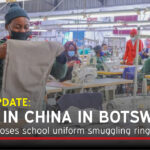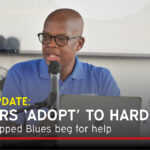Like most children, growing up, Tapiwa Masalila Mkungunugwa loved dogs.
However, the Semitwe-native never imagined that one day she would make a living out of feeding canines.
Indeed, when she graduated from Botswana College of Agriculture in 2010, dogs were the last thing on her mind
After school, Mkungunugwa worked in several agriculture shops, including Agricorp and Agrifield.
“That’s how I learned agribusiness. We sold equipment, seeds, animal feed, etc. But when I went solo in 2016, I decided to focus on dog food and accessories,” explains the 34-year-old Agrikura founder, speaking to Voice Money from her small store at Block 3’s bustling shopping complex in Gaborone.
Glancing around her shop, which is neatly stocked with different varieties of dog biscuits packaged in eye-catching, colorful bags as well as a selection of dog toys, Mkungunugwa proudly notes she has come a long way in the last four years.
“I started by doing door-to-door sales and deliveries as well as Facebook marketing. But more and more customers wanted to know where to find me. Some even wondered if they could trust me so I was forced to open shop here,” Mkungunugwa says, adding she started the venture solely with her own savings.
Agrikura is tucked away beside Tswana Spar and is easy to overlook. That doesn’t seem to be a problem for the area’s dog keepers, who keep popping in one after the other.
Mkungunugwa says her customers include dog owners and breeders.
Explaining how her love for dogs eventually turned to business, she states, “My family had dogs when I was growing up and I own three lovely dogs and I know they have to eat. Imagine coming home tired and having to cook for dogs or if you have to leave them in someone else’s care and they have to cook for them. It’s trouble, but not when you have dog food.”
With established agriculture shops and supermarkets as some of her competitors, the industry has a number of established players.
Nevertheless, Mkungunugwa feels hers exceptional service delivery gives her an advantage over the rest.
“When my customers call, I don’t hesitate to help them, even if I’ve already closed shop!” she states.
Other challenges include high rentals and the fact that she gets her stock from South Africa, which means sometimes having to endure a frustrating wait for deliveries to arrive.
Like almost all other businesses, Covid-19 has dealt a blow to Mkungunugwa’s enterprises.
“Besides the fact that I could not go stock which is now running out, I was closed for two months but still have to pay rent and utilities,” she laments.
As if to explain the sandals on her desk, Mkungunugwa picks one up and declares, “I’ve had to learn a new craft in order to diversify because things are tough right now. The leather works business is gaining traction and soon I’ll supply retailers and vendors.”
Tough as business may be, it has not diminished her future ambitions, which include moving to a bigger space, introducing more livestock feed equipment and accessories, and opening another branch.
Within the next 10 years, she intends to be producing and processing dog food, lucern, sorghum, and sunflower as well as buying crops from other farmers for processing.
Though capital is good to start big the self-funded entrepreneur says it’s best to start small so as to learn about the business.
“You will also certainly need patience,” she adds.














